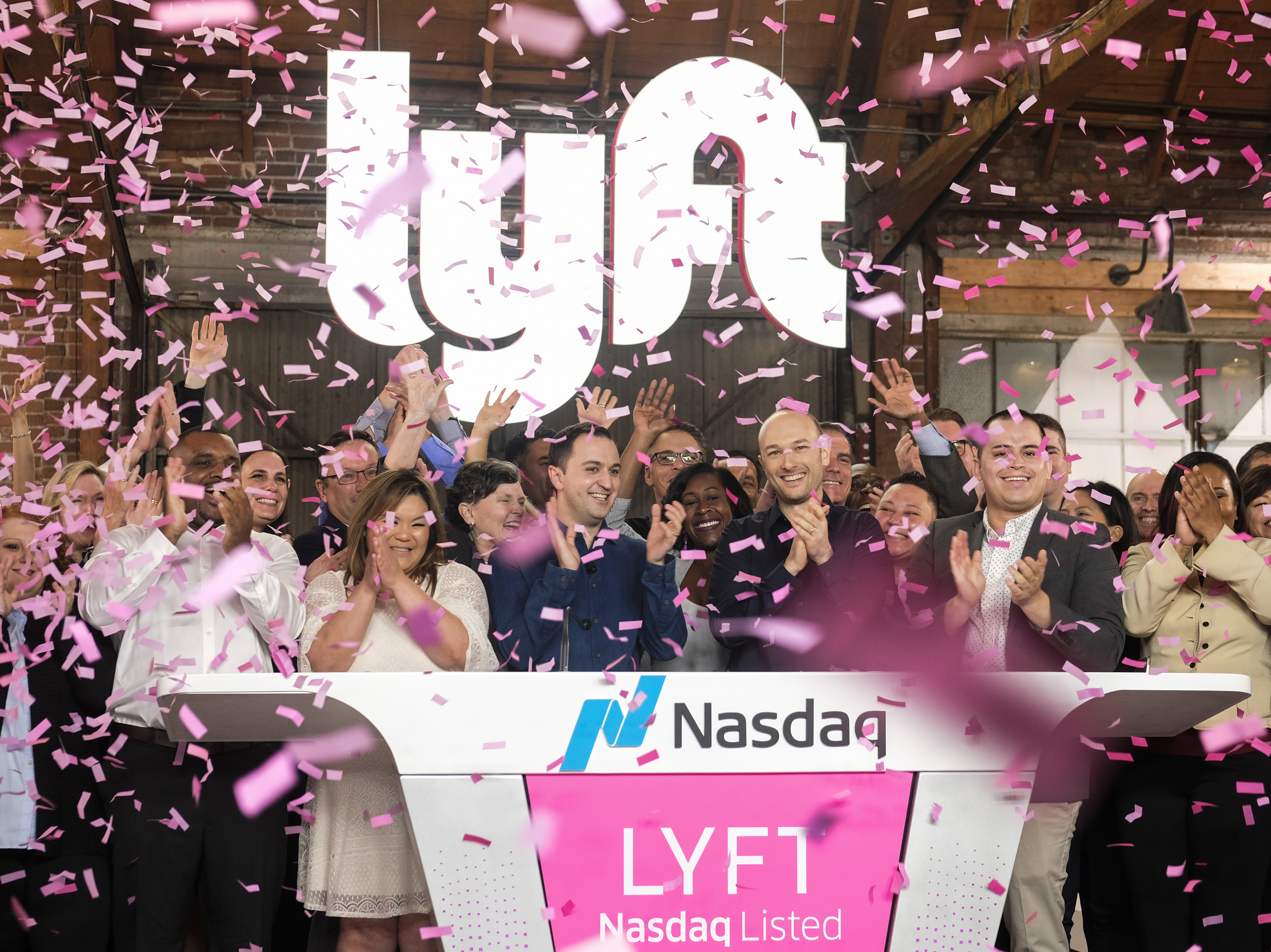 Lyft co-founders John Zimmer, front third from left, and Logan Green, front third from right, cheer as they as they ring a ceremonial opening bell in Los Angeles, Friday, March 29, 2019. On Friday the San Francisco company's stock will begin trading on the Nasdaq exchange under the ticker symbol "LYFT." (AP Photo/Ringo H.W. Chiu)
Lyft co-founders John Zimmer, front third from left, and Logan Green, front third from right, cheer as they as they ring a ceremonial opening bell in Los Angeles, Friday, March 29, 2019. On Friday the San Francisco company's stock will begin trading on the Nasdaq exchange under the ticker symbol "LYFT." (AP Photo/Ringo H.W. Chiu)Lyft's shares soared as the company went public Friday, giving investors their first chance to bet on the future of the ride-hailing industry.
The stock opened at $87.24, up 21 percent from its offering price of $72. It closed at $78.29, up 8.7 percent, giving the company a $27 billion valuation.
Investors embraced Lyft despite an uninterrupted history of losses totaling nearly $3 billion since its 2012 inception on the premise that its growing popularity will pay off in the long run. The company has lured new riders and taken market share from Uber - and now it's beaten its larger rival in the race to sell shares to the public.
Still, Lyft's path to profitability is uncertain, and it's under pressure to keep prices low as it competes for customers with Uber and traditional taxi companies. Both Uber and Lyft are relying on the eventual deployment of autonomous vehicles to help them reduce the cost of paying drivers, although deployment on a large scale could be many years away.
The IPO represents a watershed moment for ride hailing, an industry hatched from the rise of smartphones. Now that both Lyft and Uber have made it easy to summon a ride on a mobile app, more people are already starting to wonder if owning their own cars will make sense in the future.
"This is a pat on the back for ride hailing as a category," said Rohit Kulkarni, senior vice president of research at Forge.
Lyft's debut is the first of several high-profile IPOs expected to emerge this year from the technology industry, a sector that has helped propel the stock market in recent years. Others already in the pipeline include Lyft's bigger rival, Uber, digital scrapbook Pinterest and video conferencing service Zoom, with room rental service Airbnb looming as a possibility, too.
Based in San Francisco, Lyft had 1.9 million drivers and 30.7 million riders in 2018, operating in 300 markets in the U.S. and Canada. Lyft doubled its revenue last year to nearly $2.2 billion - another feat that likely lured investors to the IPO.
Uber was first out of the gate when it launched a black car taxi service in 2009. Lyft launched later in 2012, and was the first of the two to set up peer-to-peer ride hailing, where riders use the app to connect with drivers who pick them up in their own personal vehicles. Uber later added peer-to-peer ride haling to its app.
Lyft's U.S. market share has expanded from 22 percent in 2016 to 39 percent last year as Uber slogged through revelations about rampant internal sexual harassment claims , allegations that it stole self-driving technology and other mortifying issues, prompting a consumer backlash.
Meanwhile, Lyft parlayed a warm and fuzzy image that it used to cultivate by adorning drivers' cars with a fluffy pink mustache to position its brand as the more socially responsible of the two ride-hailing rivals.
